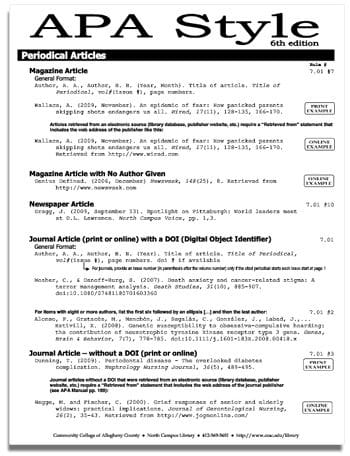Other blog posts often provide important background material for your own posts, and they are typically cited by inline links in the text. But sometimes we need more formal citations, e.g. when citing blog posts in a journal article or when providing a bibliography. But how do you properly cite a blog post?
The APA Style – from the Publication Manual of the American Psychological Association – suggests the following format:
Fenner, M.H. (2011, January 23). Beyond the PDF … is ePub [Web log post]. Retrieved from https://blog.front-matter.io/posts/beyond-the-pdf-is-epub/
This is a good start, but I think the citation should include the name of the blog. The Chicago Manual of Style does this:
Fenner, M.H., “Beyond the PDF … is ePub,” Gobbledygook, January 23, 2011, https://blog.front-matter.io/posts/beyond-the-pdf-is-epub/
The MLA Style also mentions the Publisher, and the date the blog post was accessed (in addition to the publication date):
Fenner, M.H. “Beyond the PDF … is ePub”. Gobbledygook. PLoS Blogs. January 23, 2011. Web. July 21, 2011. https://blog.front-matter.io/posts/beyond-the-pdf-is-epub/
This is a little bit too much for me. There is an argument to use the accession date for web content, but having two dates can be confusing and the publication date is more important. I personally prefer a citation format that looks very similar to a journal article citation (and comes closest to the Chicago Manual of Style):
Fenner, M.H. Beyond the PDF … is ePub. Gobbledygook, January 23, 2011. https://blog.front-matter.io/posts/beyond-the-pdf-is-epub/
If we want to include blog posts in a reference list, we also have to think about the formatting. In BibTeXa blog entry would look like this:
@misc{ author = {Fenner, Martin},
title = {Beyond the PDF … is ePub},
journal = {Gobbledygook},
type = {Blog},
number = {January 23},
year = {2011},
howpublished = {\url{https://blog.front-matter.io/posts/beyond-the-pdf-is-epub/}}
BibTeX doesn’t have an entry type for blog posts, so we have to use @misc and use the type field. @unpublished is an alternative, but that is a strange name. We have to put the URL into the howpublished field, which is also awkward.
RIS is another popular format, and knows about blogs and URLs:
TY - BLOG AU - Fenner, Martin TI - Beyond the PDF … is ePub JF - Gobbledygook PY - 2011/01/23 UR - https://blog.front-matter.io/posts/beyond-the-pdf-is-epub/ ER -
BibTeX and RIS both predate the web. A modern reference format should use HTML or XML so that it can be embedded directly in the blog post. The recently announced Schema.org micro data format is a strong candidate for this Scholarly HTML, and it has a BlogPosting format:
<div itemscope itemtype="http://schema.org/BlogPosting"> <span itemprop="author" itemscope itemtype="http://schema.org/Person"> <span itemprop="name">Fenner, Martin</span> </span> <span itemprop="name">Beyond the PDF … is ePub</span> <span itemprop="publisher">Gobbledygook</span> <time datetime="2011-01-23">01/23/11</time> <a href="https://blog.front-matter.io/posts/beyond-the-pdf-is-epub/" itemprop="url">https://blog.front-matter.io/posts/beyond-the-pdf-is-epub/</a> </div>
There are other ways to describe this blog post with Schema.org, but the best practices are still evolving. How this BlogPosting above looks in a blog obviously depends on the CSS styling used, without any styling it looks like this:
Fenner, Martin
Beyond the PDF … is ePub
Gobbledygook
01/23/11
https://blog.front-matter.io/posts/beyond-the-pdf-is-epub/
With a little work on the CSS for this blog, the citation could look exactly as shown above, but with added semantic information that is understood by search engines and other tools. It is clear to me that HTML-based standards such as Schema.org are the future for embedding citation information in blog posts. We need better tools to make this process as painless as possible.


